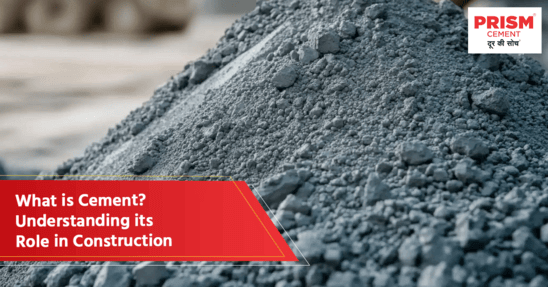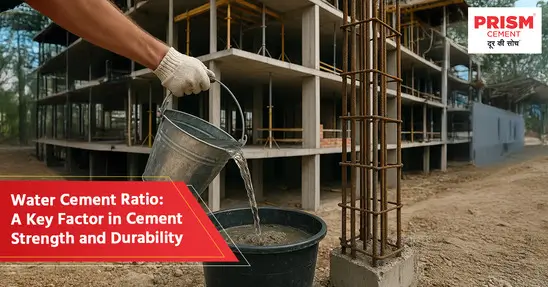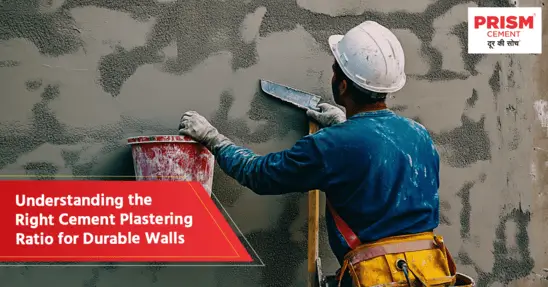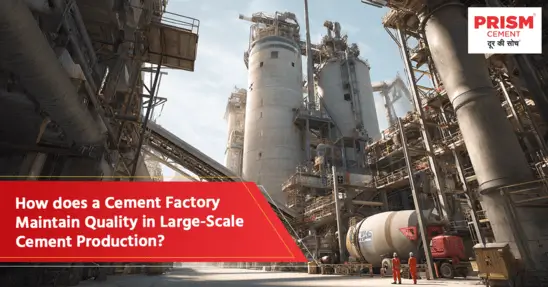Take a moment and look around. The buildings you live in, the roads you travel on, and the bridges you cross every day—what do they all have in common? Cement. It’s the invisible force holding everything together, playing a crucial role in modern infrastructure.
But what is cement, really? Is it the same as concrete? Why is it used in almost every construction project? And how do you choose the best cement for house construction? If you’re planning to build something that stands the test of time, understanding construction materials is the first step. Let’s break it down in the simplest way possible.
At Prism Cement, we believe that strong buildings start with strong foundations, and that begins with the right cement for construction.
What is Cement?
To put it simply, cement is like the glue that holds buildings together. It’s a fine gray powder that when mixed with water, turns into a paste that hardens over time and acts as a binding agent. This hardened mix binds materials like sand, gravel and bricks, making it one of the most essential construction materials in the world.
A common mistake people make is thinking cement and concrete are the same. They’re not! Cement is just one ingredient in concrete. Concrete is a mix of cement for construction, sand, gravel and water, while mortar is used specifically for bonding bricks and stones. Without cement, none of these materials would stick together.
That’s why choosing high-quality cement for construction—like what we offer at Prism Cement—is so important for durability and strength.
How is Cement Made?
The cement production process is a bit like baking a cake, but on a massive scale:
- Raw Materials – Limestone, clay, and other minerals are mined
- Crushing & Mixing – These materials are ground and blended to create the homogenous mix
- Heating in a Kiln – The mixture is heated at around 1450°C, turning it into clinker (small, rock-like chunks)
- Grinding – The clinker is ground into a fine powder, and a bit of gypsum is added to control setting time
At Prism Cement, we follow advanced construction techniques to ensure our cement meets the highest quality standards.
Types of Cement and their Uses
Not all cement for construction is the same. Depending on the project, you might need different types of cement:
- Ordinary Portland Cement (OPC) – The most commonly used construction material, great for homes and commercial buildings
- Portland Pozzolana Cement (PPC) – Ideal for coastal and damp areas; Portland Pozzolana Cement usage provides increased durability and resistance to moisture
- Sulfate-Resistant Cement – Best for areas exposed to harsh chemicals, like industrial zones
- White Cement – Used for aesthetic and decorative construction work
If you’re wondering which cement brand is best for house construction, Prism Cement has covered with options for every need.
Why is Cement So Important in Construction?
Think of cement as the backbone of modern buildings. Without it, structures wouldn’t be as strong or long-lasting. Here’s why it’s essential:
Strength & Durability – Cement-based structures can support heavy loads and extreme weather conditions.
Versatility – It’s used in everything from roads and bridges to homes and skyscrapers.
Sustainability – Advancements in construction techniques make cement production more eco-friendly.
Longevity – Choosing the best cement for house construction ensures buildings last for generations.
At Prism Cement, we take pride in offering high-quality construction materials that make every structure safer and stronger.
How to Choose the Right Cement for Your Project?
So, which cement brand is best for house construction? Here’s what you should look for:
Project Type – Different structures need different types of cement.
Weather Conditions – Specific type of cement works better in humid or extreme climates.
Setting Time & Strength – Quick-setting cement is perfect for fast-paced projects.
Brand Reliability – Always go for a trusted name like Prism Cement, known for high-quality cement for construction.
By making the right choice, you ensure that your project remains strong and durable for years to come.
Sustainable Cement & Future Innovations
As the world is moving towards eco-friendly solutions, the cement industry is evolving. Some exciting innovations include:
Green Cement – Made by adding alternative materials to traditional cement to reduce carbon emissions
Energy-Efficient Manufacturing – New construction techniques cut down on waste and energy use
Self-Healing Concrete – Imagine cement that repairs its own cracks!
At Prism Cement, we’re committed to sustainability while ensuring top-notch quality and durability.
Conclusion
At the end of the day, cement isn’t just another construction material—it’s the foundation of modern life. Whether you’re building a home, an office or a massive bridge, using the right cement for construction ensures that your project stands strong for years to come.
Choosing the best cement for house construction isn’t just about picking a brand—it’s about making sure your structure is safe, durable and long-lasting. And when it comes to trusted cement manufacturers, Prism Cement is the name to rely on.
Frequently Asked Questions (FAQ)
Q1. What is cement and how is it different from other binding materials?
Answer: Cement is a fine powder that binds construction materials together when mixed with water. Unlike lime or clay, it hardens into a rock-solid mass.
Q2. Why is cement essential in construction projects?
Answer: Cement provides the strength and durability needed to keep buildings, bridges and roads standing for decades.
Q3. What are the primary ingredients used in making cement?
Answer: Cement is made from limestone, clay, silica and iron ore, heated at high temperatures to form a strong binding agent.
Q4. How does cement contribute to the strength of concrete structures?
Answer: Cement reacts with water to create a hard, solid mass that binds sand and aggregates together, forming durable concrete.
Q5. What are the different types of cement used in construction?
Answer: Common types of cement include Ordinary Portland Cement (OPC), Portland Pozzolana Cement (PPC), Sulfate-Resistant Cement and White Cement, each suited for different purposes.




